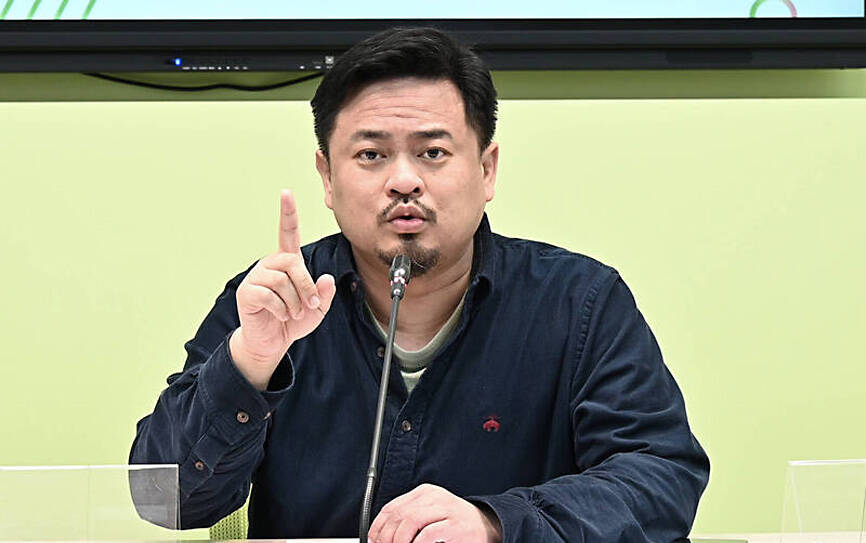Democratic Progressive Party (DPP) Legislator-at-large Hung Sun-han (洪申翰) has been chosen to succeed Ho Pei-shan (何佩珊) as minister of labor.
Ho stepped down on Friday following criticism over her handling of a suspected suicide case, in which a Ministry of Labor worker killed himself after allegedly being bullied by a supervisor, a Cabinet spokesperson said.
Late on Friday, Executive Yuan spokeswoman Michelle Lee (李慧芝) confirmed the appointment, saying Premier Cho Jung-tai (卓榮泰) had consulted with Hung, who agreed to take up the new post.

Photo: Taipei Times
Hung was a civil rights activist before he became a DPP lawmaker for the second time following the legislative election in January.
Lee said that as a vocal civic activist, Hung is familiar with the interactions between the public and private sectors, while as a lawmaker, he is known for his concern for labor issues, such as workers’ living and occupational security.
Hung has been keen on seeking measures to protect workers and was devoted to building a safe workplace, Lee added.
Cho has encouraged Hung to continue contributing to the country as minister of labor, Lee said, adding that Cho also urged Hung to keep working hard on labor rights matters.
Ho first tendered her resignation on Wednesday amid a controversy involving the suicide of a ministry employee earlier this month. She offered her resignation again on Thursday, which was approved by the premier.
Ho is the shortest-serving minister of labor, in office for only 186 days. She was sworn in on May 20, when President William Lai (賴清德) took office.
The body of the 39-year-old employee, surnamed Wu (吳), was discovered at the Executive Yuan’s Sinjhuang Joint Office Tower in New Taipei City on Nov. 4. Speculation on social media said that workplace bullying by his supervisor Hsieh Yi-jung (謝宜容) had driven him to take his own life.
A report by the ministry earlier this week said that no evidence linked Hsieh to Wu’s suicide.
However, Ho on Tuesday said that Hsieh’s management style and “control over her emotions” were “inappropriate” and “resulted in staff feeling like they were being bullied in the workplace.”
Hsieh was “not the direct cause” of Wu’s death, Ho said, attributing the death instead to “excessive workload,” “too much stress” and a “lack of support resources.”
Ho’s remarks sparked an outcry.
On the other hand, Hung said the controversy indicated management problems inside the ministry.
The agency in charge of labor affairs should stop fabricating punch-in and out records, Hung said.
During a trip to Kaohsiung on Friday, Lai said that the government should build a work environment friendly to personnel, and that the public and private sectors need to take such issues seriously.
The government must review laws and introduce amendments when necessary to build a strong legal mechanism that protects workers, he said.
People experiencing suicidal thoughts can call the 1925, 1995 or 1980 hotlines for counseling or assistance.

US climber Alex Honnold is to attempt to scale Taipei 101 without a rope and harness in a live Netflix special on Jan. 24, the streaming platform announced on Wednesday. Accounting for the time difference, the two-hour broadcast of Honnold’s climb, called Skyscraper Live, is to air on Jan. 23 in the US, Netflix said in a statement. Honnold, 40, was the first person ever to free solo climb the 900m El Capitan rock formation in Yosemite National Park — a feat that was recorded and later made into the 2018 documentary film Free Solo. Netflix previewed Skyscraper Live in October, after videos

NUMBERS IMBALANCE: More than 4 million Taiwanese have visited China this year, while only about half a million Chinese have visited here Beijing has yet to respond to Taiwan’s requests for negotiation over matters related to the recovery of cross-strait tourism, the Tourism Administration said yesterday. Taiwan’s tourism authority issued the statement after Chinese-language daily the China Times reported yesterday that the government’s policy of banning group tours to China does not stop Taiwanese from visiting the country. As of October, more than 4.2 million had traveled to China this year, exceeding last year. Beijing estimated the number of Taiwanese tourists in China could reach 4.5 million this year. By contrast, only 500,000 Chinese tourists are expected in Taiwan, the report said. The report

Temperatures are forecast to drop steadily as a continental cold air mass moves across Taiwan, with some areas also likely to see heavy rainfall, the Central Weather Administration (CWA) said. From today through early tomorrow, a cold air mass would keep temperatures low across central and northern Taiwan, and the eastern half of Taiwan proper, with isolated brief showers forecast along Keelung’s north coast, Taipei and New Taipei City’s mountainous areas and eastern Taiwan, it said. Lows of 11°C to 15°C are forecast in central and northern Taiwan, Yilan County, and the outlying Kinmen and Lienchiang (Matsu) counties, and 14°C to 17°C

STEERING FAILURE: The first boat of its class is experiencing teething issues as it readies for acceptance by the navy, according to a recent story about rudder failure The Hai Kun (海鯤), the nation’s first locally built submarine, allegedly suffered a total failure of stern hydraulic systems during the second round of sea acceptance trials on June 26, and sailors were forced to manually operate the X-rudder to turn the submarine and return to port, news Web site Mirror Daily reported yesterday. The report said that tugboats following the Hai Kun assisted the submarine in avoiding collisions with other ships due to the X-rudder malfunctioning. At the time of the report, the submarine had completed its trials and was scheduled to begin diving and surfacing tests in shallow areas. The X-rudder,